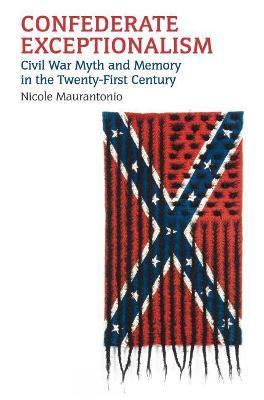Confederate Exceptionalism: Civil War Myth and Memory in the Twenty-First Century

Confederate Exceptionalism: Civil War Myth and Memory in the Twenty-First Century
Along with Confederate flags, the men and women who recently gathered before the Virginia Museum of Fine Arts carried signs proclaiming "Heritage Not Hate." Theirs, they said, was an "open and visible protest against those who attacked us, ours flags, our ancestors, or our Heritage." How, Nicole Maurantonio wondered, did "not hate" square with a "heritage" grounded in slavery? How do so-called neo-Confederates distance themselves from the actions and beliefs of white supremacists while clinging to the very symbols and narratives that tether the Confederacy to the history of racism and oppression in America? The answer, Maurantonio discovers, is bound up in the myth of Confederate exceptionalism--a myth whose components, proponents, and meaning this timely and provocative book explores. The narrative of Confederate exceptionalism, in this analysis, updates two uniquely American mythologies--the Lost Cause and American exceptionalism--blending their elements with discourses of racial neoliberalism to create a seeming separation between the Confederacy and racist systems. Incorporating several methods and drawing from a range of sources--including ethnographic observations, interviews, and archival documents--Maurantonio examines the various people, objects, and rituals that contribute to this cultural balancing act. Her investigation takes in "official" modes of remembering the Confederacy, such as the monuments and building names that drive the discussion today, but it also pays attention to the more mundane and often subtle ways in which the Confederacy is recalled. Linking the different modes of commemoration, her work bridges the distance that believers in Confederate exceptionalism maintain; while situated in history from the Civil War through the civil rights era, the book brings much-needed clarity to the constitution, persistence, and significance of this divisive myth in the context of our time.
PRP: 438.09 Lei
Acesta este Pretul Recomandat de Producator. Pretul de vanzare al produsului este afisat mai jos.
394.28Lei
394.28Lei
438.09 LeiIndisponibil
Descrierea produsului
Along with Confederate flags, the men and women who recently gathered before the Virginia Museum of Fine Arts carried signs proclaiming "Heritage Not Hate." Theirs, they said, was an "open and visible protest against those who attacked us, ours flags, our ancestors, or our Heritage." How, Nicole Maurantonio wondered, did "not hate" square with a "heritage" grounded in slavery? How do so-called neo-Confederates distance themselves from the actions and beliefs of white supremacists while clinging to the very symbols and narratives that tether the Confederacy to the history of racism and oppression in America? The answer, Maurantonio discovers, is bound up in the myth of Confederate exceptionalism--a myth whose components, proponents, and meaning this timely and provocative book explores. The narrative of Confederate exceptionalism, in this analysis, updates two uniquely American mythologies--the Lost Cause and American exceptionalism--blending their elements with discourses of racial neoliberalism to create a seeming separation between the Confederacy and racist systems. Incorporating several methods and drawing from a range of sources--including ethnographic observations, interviews, and archival documents--Maurantonio examines the various people, objects, and rituals that contribute to this cultural balancing act. Her investigation takes in "official" modes of remembering the Confederacy, such as the monuments and building names that drive the discussion today, but it also pays attention to the more mundane and often subtle ways in which the Confederacy is recalled. Linking the different modes of commemoration, her work bridges the distance that believers in Confederate exceptionalism maintain; while situated in history from the Civil War through the civil rights era, the book brings much-needed clarity to the constitution, persistence, and significance of this divisive myth in the context of our time.
Detaliile produsului








